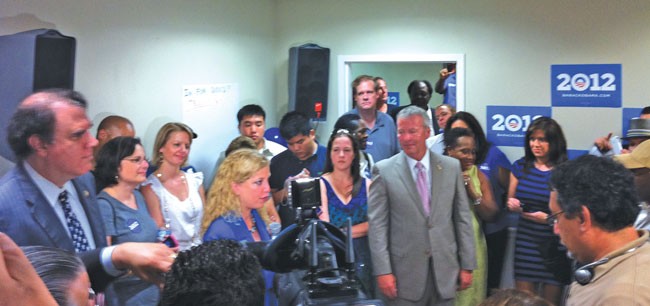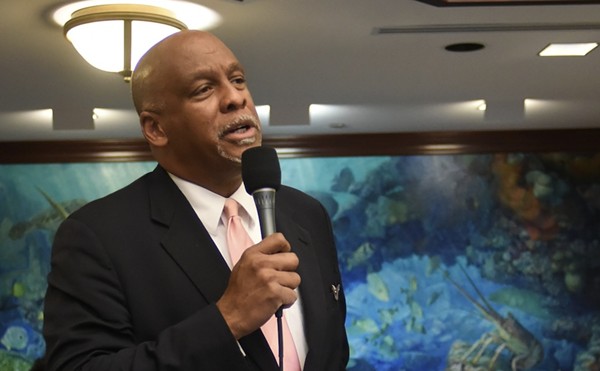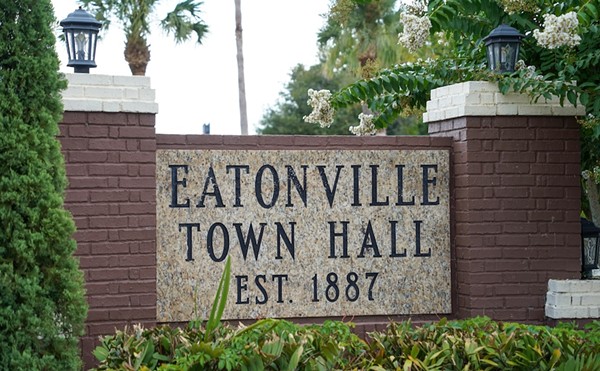With all of the cyclonic uncertainty menacingly wobbling off the coast, we weren’t even sure what we were thinking about on Aug. 25. That was the Thursday that could have ended all Thursdays, the tempest to topple our teapots, so just about the last thing we expected among the feeder-band flare-ups of a fickle Irene was to be thrust into the similarly tempestuous dizziness of the 2012 presidential election, now brought to you by prayer and hairspray. Frankly, we would rather have been hunkering down.
But that wasn’t to be. Right across the street from Happytown™ HQ’s boarded up fallout shelter the folks of Organizing for America (or Obama for America, depending on who you talk to) were sowing the grass-roots seeds for next year’s campaign effort with the ceremonious opening of their brand new offices. Punch and pie!
When we arrived around 7:30 p.m. there was already a line of concerned faces and wonkish opportunists queuing up the foyer stairs in what would immediately become a sweat waterfall of overcapacity. Most were in attendance to get “fired up” – that’s a chant, see – about the president’s re-election campaign via a promised visit from Congresswoman Debbie Wasserman Schultz, chair of the Democratic National Committee and the foghorn firebrandof the Sunday teevee talking tables.
Congressional hopeful (and former Orlando police chief) Val Demings was pressed up against our back for a few minutes, forcing an awkward (arresting?) conversation in which she seemed to imply that we needed to write her a check or we would not be going home.
Eventually we were yanked into what was a makeshift press area – also known as a kitchen – to do what we always do at these events: stand, wait and count the sweat droplets that descend from our nape to our ass. A couple of volunteers were pushed in our direction by a media handler, and both gave the desired blips about the ramping up of ground operations locally. “The response has been awesome,” offered Elva Smith, optimistically. Her compatriot-with-the-most-amazing-name-ever, Fedorah Philippeaux, was a little more circumspect. “They need to get us a message from D.C.,” she said. “If [they] don’t do that now, we could lose this.”
Uh-oh. From then on, the next two hours were as much a lesson in fire-hazard crisis management as they were in the group dynamics of crowding Democrats. In short, everyone knows that the I-4 corridor is going to decide the 2012 stakes, this whole thing is going to make 2008 look like “amateur hour,” and no, we don’t want to take two steps back to make room for the chairwoman in this sweatlodge of earnestness.
By the time Wasserman Schultz arrived at 9 p.m. (precisely the time the event was supposed to wrap up – Democrat time!),nerves were frayed, brows were wet and the elderly were crawling away. Somebody made a joke about mean old Allen West and crazy-haired Rick Perry, but nobody was laughing anymore. And then it happened: The diminutive chairwoman parted the crowd flanked by – wait for it – former U.S. Rep. Alan Grayson (yikes!) and Orlando Mayor Buddy Dyer (“The best mayor in the United States of America,” apparently). The requisite boilerplate of making “the middle class a priority,” and talk of jobs and gay rights followed, leading up to Wasserman Schultz’s calling for the “most robust, effective grass-roots campaign in history.” Um, again.
After the grandstanding, we got pushed into a side office with the chairwoman and Dyer – “Anyone got a blotter?” the pool of sweat known as Dyer’s face asked – and we got our own one minute with our favorite lady Democrat.
“So, obviously the messaging is going to have to be different, right?” we blew some hot air. “I mean, you can’t go around saying ‘hope’ or, especially, ‘change’ in this situation, can you?”
“I think what we’re tasked with doing is making sure that we can talk to people about our accomplishments, make people understand that Barack Obama was responsible for finally giving access to healthcare to everyone in America,” she speed-spoke. “For seniors in our state, showing them how we closed the prescription drug gap in coverage and [made] sure that they don’t have to worry about scoring their pills anymore. Like choosing between medicine and meals.”
Pills, please. Go on, congresswoman. “Making sure that they understand that, going forward, Democrats under his leadership will fight to protect Social Security and Medicare. Republicans have proposed to end both as we know it. That’s unacceptable and the third rail in Florida. We need to make sure that we preserve Social Security and Medicare for the long term, but we need Republicans to work with us – that’s what he’s been pushing hard for. Unfortunately they don’t seem to be interested in doing that. The only job they’re worried about is Barack Obama’s, and we’re going to make sure people understand our priorities.”
Try fitting that on a bumper sticker.
Dark, dark days lie ahead for Florida’s prisons – the state’s former Department of Corrections chief, Edwin Buss, abruptly resigned on Aug. 24, and less than a week prior, the independent Correctional Medical Authority, an agency that monitored the quality of healthcare in the state’s prisons, closed its doors. The CMA was muscled out of the state’s budget during this spring’s legislative session, the same session during which legislators arranged to hand over the entirety of the prison healthcare system to private companies.
Democratic dissenters, neutered by a Republican majority during their time in Tallahassee, have belatedly turned to their Plan B – complaining publicly. On Aug. 19 Senate Democratic Leader Pro Tempore Arthenia Joyner, D-Tampa, and Rep. Mark Pafford, D-West Palm Beach, called the shuttering of the CMA “a grave mistakeopening Florida and Florida taxpayers to the possibility of widespread financial and legal repercussions” in a prepared statement.
The entire reason for the agency’s existence, the legislators point out, was an agreement between the federal courts and the state following a lawsuit in 1972 over inadequate healthcare in Florida’s prisons, resulting partly from overcrowding. Therefore, critics like Joyner and Pafford argue, the elimination of an oversight agency, which had only cost the state $717,680 per year, could end up costing the state much more in court.
Who’s to blame for the death of the CMA, besides the CannonHair™-led Republicansin the State Legislature from whom we never expected any noble deeds in the first place? Governor Rick Scott, perhaps? Nope. In fact, the governor – get ready for this, Happytown loyalists – took a sensible position on the matter, proposing that a small portion of the Department of Corrections’ budget be siphoned off to save the CMA. This plan, however, was blocked by the Florida House. Also, in May, Scott vetoed the bill that would have erased the CMA from the state statutes, meaning sympathetic legislators could take a swipe at refunding it during the next legislative session. But then again, the next session will feature the same (im)balance of power as the last. “Governor Scott is disappointed that the legislature didn’t see the value in [the CMA],” Lane Wright, the governor’s spokesperson, told the Weekly. “He did everything he could to save it.”
So where were we again? Ah yes, blame. Well, how about our cohorts in the media? Hard looks at potential consequences of closing the CMA have, for the most part, only appeared in print after the agency was already dead and buried. An editorial by the Sun-Sentinel advocating the sustenance of the CMA didn’t appear until a week after the agency closed – though the Legislature’s desire to eliminate it in May was not a closely guarded secret. “It had all the makings of a fiasco – to me, it was obvious,” says Jim McDonough, the state’s former secretary of corrections, whom we spoke with on Aug. 25. “But I never saw a story on it until a couple days ago.” (We kindly reminded McDonough that we mentioned the Legislature’s plans to eliminate the CMA in our May 19 story, “Privacy Policy.”)
But for prisoners in South Florida, where all correctional facilities are set to be privatized by the beginning of next year, there is a silver lining to this cloud: Many private companies provide their inmates with air conditioning, which feels amazing on an open wound.




















